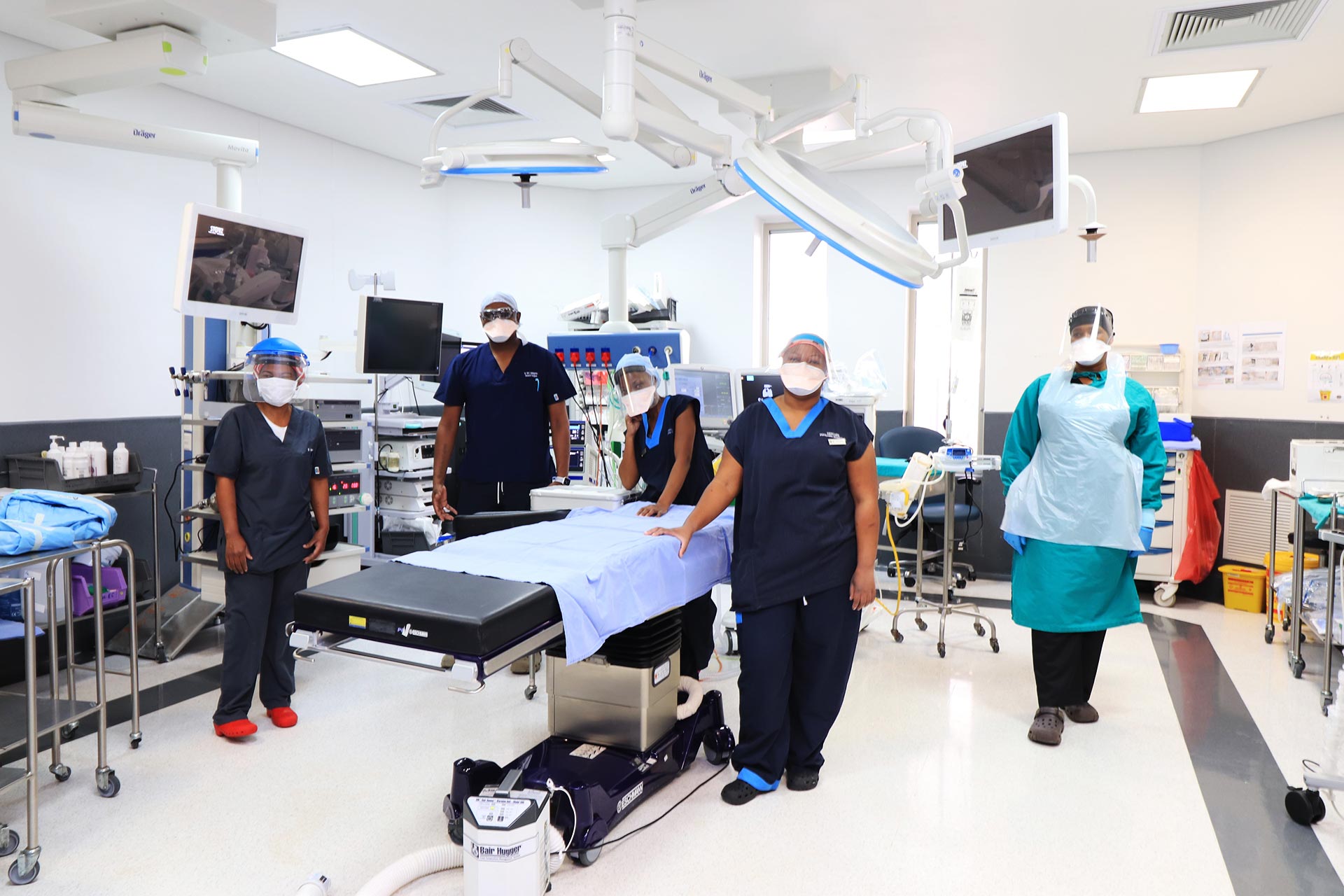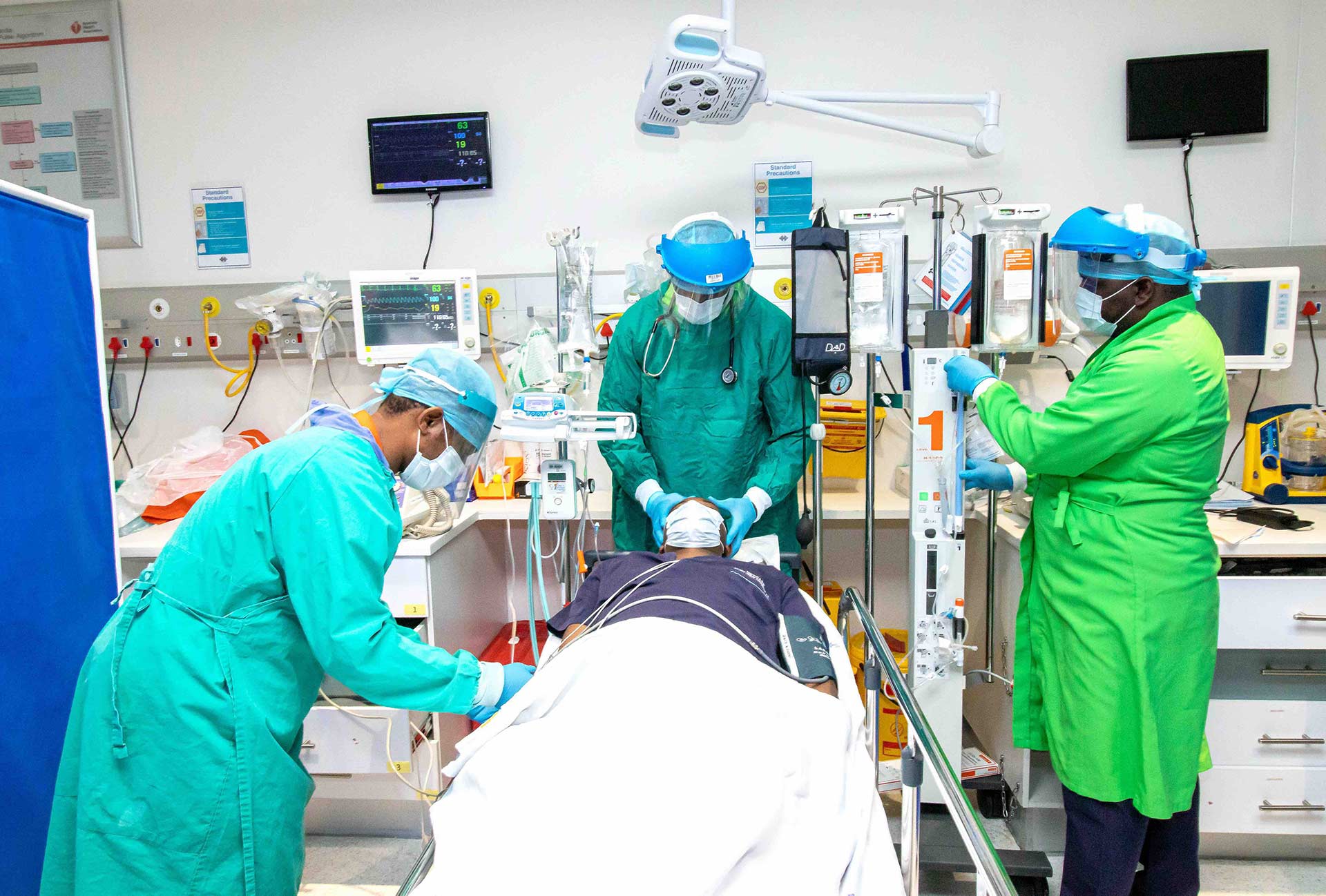Netcare Pholoso Hospital achieves Level II trauma centre accreditation
Drickus Maartens • June 22, 2020
(Left to right): Registered nurse, Sr Winnie Sebat; head of Netcare Pholoso Hospital’s trauma programme and lead general surgeon Dr Nelson Latakgomo; enrolled nurse auxiliary, Delina Legodi; enrolled nurse, Anna Machaka; and anaesthetist, Dr Sylvia Dlamini are pictured in the trauma theatre of the emergency department of Netcare Pholoso Hospital. The hospital is Limpopo’s first Level II trauma centre to be accredited by the Trauma Society of South Africa.
TSSA certification an important development for emergency medicine in Limpopo
The Trauma Society of South Africa (TSSA)
has accredited Netcare Pholoso Hospital
as a Level II trauma centre, certifying that the necessary professional medical services are available at the facility to deal with trauma cases and medical emergencies in line with international best practice in trauma medicine.
Mande Toubkin, Netcare’s general manager: emergency, trauma, transplant and CSI, says that the hospital is the first TSSA-accredited trauma centre in Limpopo province.
“Netcare Pholoso Hospital, which opened in September 2015, has in a relatively short time established a reputation among the communities of Polokwane and further afield, as a trusted private healthcare provider, and this will be further cemented with the hospital’s trauma accreditation,” she says.
“Accreditation processes, such as those employed by the TSSA to benchmark trauma centres within South Africa, have been shown internationally to encourage best practice, patient advocacy, patient safety and improved clinical outcomes. This contributes to the strengthening of provincial and national systems of trauma treatment, which ultimately benefits the communities served by accredited trauma facilities such as Netcare Pholoso Hospital.”
Head of Netcare Pholoso Hospital’s trauma programme, general surgeon Dr Nelson Latakgomo, says that the TSSA accreditation is the culmination of a long process and considerable hard work by doctors, management, nurses and support staff at the hospital.
“The high standards and the rigorous processes that the TSSA sets for accredited trauma centres to implement to ensure that trauma protocols are followed fully, provide assurance to the public that Netcare Pholoso Hospital is equipped to handle complex medical emergencies, including life-threatening injuries to adults and children. We are committed to maintaining these standards consistently into the future, as they are monitored by the TSSA on an ongoing basis.”
Dr Latakgomo notes that in the past, Limpopo residents who sustained critical or ‘P1’ injuries in the province were, in many cases, airlifted to Netcare Milpark Hospital in Johannesburg because of that facility’s Level I trauma centre status.
“Now that Netcare Pholoso Hospital is accredited as a Level II trauma centre, such patients can now be effectively treated much nearer their homes and families. The only difference between a Level I and Level II TSSA accreditation is the requirement for Level I trauma centres to have community education trauma prevention programmes in place.
“Not only does Netcare Pholoso Hospital’s Level II accreditation have cost-saving implications for individuals, families and healthcare funders alike, it also means that, crucially, if a person is injured here in Limpopo the transit time to our accredited trauma centre is potentially significantly reduced, which can improve a person’s clinical outcome. We are therefore pleased to bring this level of care to our communities’ doorstep,” Dr Latakgomo says.
The emergency department unit manager at Netcare Pholoso Hospital, Simon Shayi, who has 14 years’ experience in the field of emergency medicine, says where necessary, specialists from different disciplines within the hospital consult on trauma cases.
“This capacity to provide round-the-clock multi-disciplinary care is an essential aspect of Level II trauma centres, and it is reassuring for the public to know that we are able to treat high priority and potentially life-threatening emergencies, including polytrauma cases, in a coordinated and effective manner.
“As part of the accreditation process, the emergency department doctors and other specialists, nursing and intensive care unit staff members are required to follow trauma protocols,” Shayi explains.
The emergency department at Netcare Pholoso Hospital incorporates five private examination bays, three resuscitation bays with X-ray equipment on hand in the resuscitation area, a separate room for treating children, as well as a Netcare sexual assault centre for survivors of sexual assault. There is also a landing pad on the hospital premises for patients brought in by helicopter air ambulance.
The general manager of Netcare Pholoso Hospital, Fabion Bennet, welcomed the accreditation and expressed thanks to the TSSA as well as to the doctors, hospital staff and others within Netcare who contributed to its attainment.
“Dr Latakgomo and his team, as well as Simon Shayi, deserve special recognition for their efforts towards this milestone in our hospital’s history, which is also an important development for healthcare in the province,” Bennet says.
“We have been working towards achieving this goal since April 2018, and our sincere appreciation goes to the national Netcare trauma team under the leadership of Mande Toubkin for their robust support throughout the accreditation process,” he concluded.
Netcare Pholoso Hospital is the first facility in Limpopo province to be accredited by the Trauma Society of South Africa (TSSA). The hospital achieved accreditation as a Level II trauma centre, and is equipped to treat high priority and potentially life-threatening emergencies, including polytrauma cases. In a simulated resuscitation, trauma-trained registered Nurse Brian Masahaba (left) and lead emergency department doctor, Dr Rhulani Khosa (centre), assisted by the emergency department unit manager, Simon Shayi, show how a patient would be attended to in the state of the art trauma resuscitation section of the emergency department.
Netcare hospitals that are accredited by the Trauma Society of South Africa:
KwaZulu-Natal
- Netcare St Anne’s Hospital – Level I
- Netcare St Augustine’s Hospital – Level II
- Netcare uMhlanga Hospital – Level II
- Netcare Alberlito Hospital – Level III
- Netcare Kingsway Hospital – Level III
Western Cape
- Netcare Blaauwberg Hospital – Level III
- Netcare Kuilsriver Hospital – Level III
Limpopo
- Netcare Pholoso Hospital – Level II
Gauteng
- Netcare Milpark Hospital – Level I
- Netcare Union Hospital – Level I
- Netcare Sunninghill Hospital – Level II
- Netcare Garden City Hospital – Level II
- Netcare Unitas Hospital – Level II
- Netcare Linksfield Hospital – Level III
- Netcare Olivedale Hospital – Level III
- Netcare Waterfall City Hospital – Level III
- Netcare Krugersdorp Hospital – Level III
- Netcare Pinehaven Hospital – Level III
- Netcare Pretoria East Hospital – Level III
- Netcare Montana Hospital – Level III














